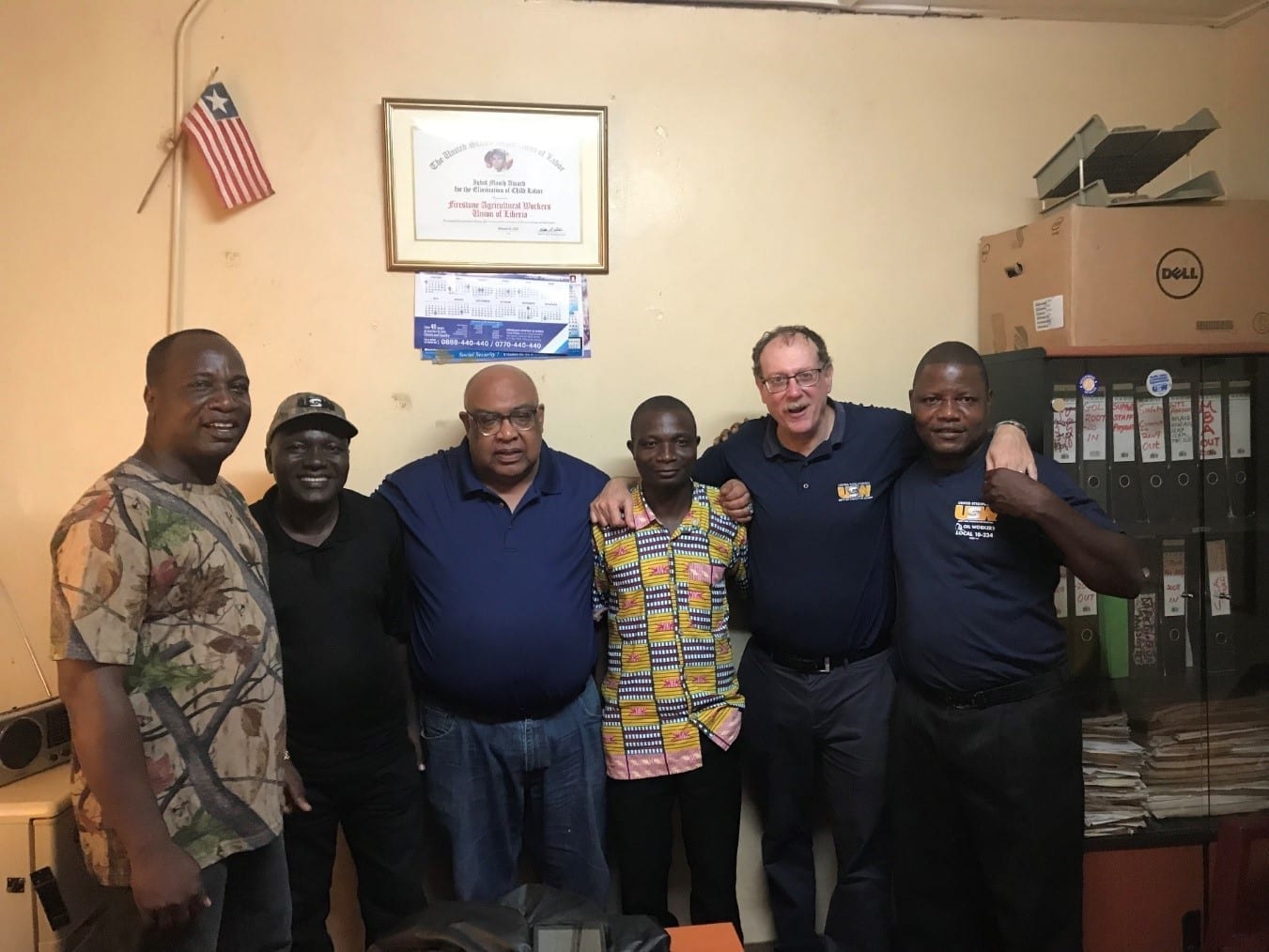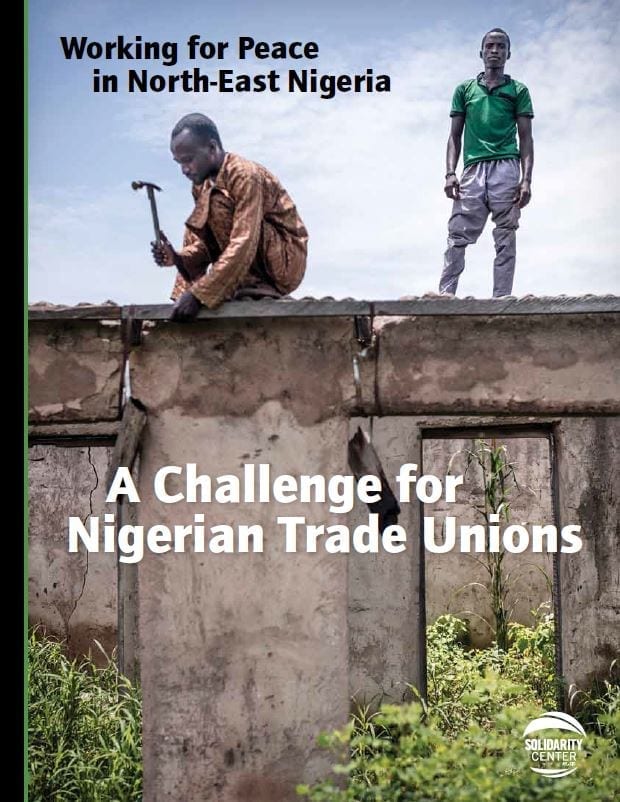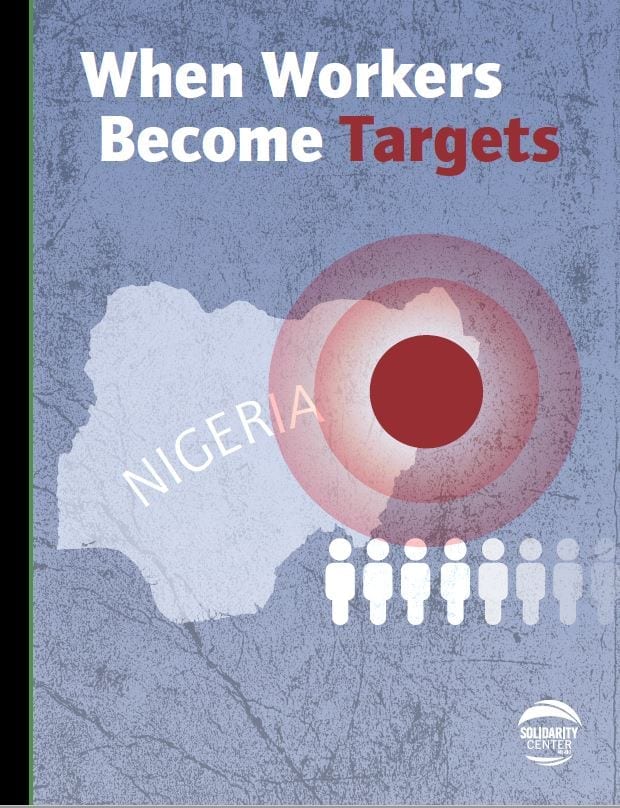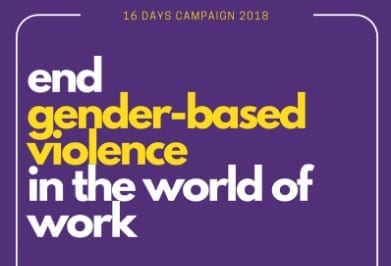
Jan 7, 2019
Benefiting hundreds of miners, forklift drivers and other workers, the United Workers Union of Liberia (UWUL) and ArcelorMittal Liberia (AML)—part of global steel giant ArcelorMittal group—signed their fourth labor contract in Monrovia December 14. The three-year contract includes a 14.5 percent wage increase over the duration of the contract as well as a sexual harassment clause to protect workers, especially women. The contract continues workers’ effort to close the wage gap between resident and expatriate workers, who can receive up to 10 times the salary for the same work.
“While these unions have very little in the way of material resources, they have shown themselves to be unstoppable when it comes to building union power and mobilizing their members,” says Fred Redmond, president of the United Steelworkers (USW), which supports organizing efforts with UWUL, a Solidarity Center ally.
According to Redmond, UWUL is having significant impact on workers in Liberia beyond its footprint through a “surge of organizing” at several new mining operations and—through a new contract—providing momentum for workers currently negotiating with Firestone Liberia and Golden Veroleum’s palm oil farms.
Two wildcat strikes broke out at an AML mine in Yekepa, Nimba County, earlier this year when workers protested low wages, wage theft, job insecurity, lack of healthcare, poor housing and lack of schooling for workers’ children. Members of the Liberia House of Representatives last month voted to audit AML to investigate its compliance with its Mineral Development Agreement (MDA) with the government of Liberia, which requires the company to establish and maintain medical and education facilities for employees, their families and the broader community, and to prioritize the employment and development of local Liberians.
AML ranks fifth in size of 25 ArcelorMittal mining companies worldwide. The company has about 300,000 employees in 60 countries around the world, including Brazil, Bosnia, Canada, France, Mexico, Ukraine and the United States.
In Liberia, the Solidarity Center and the USW partner with workers in key extractive industries such as mining, timber and rubber, as well as with domestic workers, to enable unions to better serve their members and organize additional workers. UWUL began organizing AML in 2008 with training and support from the Solidarity Center and USW, winning the right to represent workers in 2009. The workers’ first agreement with AML was negotiated in 2012.

Dec 22, 2018
This report analyzes the impact of violence in North-East Nigeria, where teachers, health care professionals and civil servants were the victimized by insurgents targeting symbols of state authority. The report includes recommendations for government and worker organizations as they rebuild after relative peace was restored in the area in 2017 and workers return to their jobs.
Download here.

Dec 22, 2018
“When Workers Become Targets: Nigeria,” is a collection of real-life experiences of workers, particularly women, during the Boko Haram insurgency in Borno State, North-East Nigeria, and how unions whose members suffered the greatest toll played a crucial role in the rehabilitation of people displaced by the insurgency and held government accountable by speaking out against the forced return of workers to unsafe areas.
Download here.

Nov 20, 2018
The U.S.-based Amalgamated Bank has selected the Solidarity Center as one of its featured nonprofits in an online contest. The organization that receives the most votes will receive up to $5,000 and be recognized as a prominent social justice organization making change for workers.
(Please click here to vote for the Solidarity Center.)
The campaign runs through December 7—and you can vote for the Solidarity Center once a day!
The Amalgamated Bank campaign is part of “#GivingTuesday,” an annual event that takes place on the Tuesday following Thanksgiving. Amalgamated Bank’s contest is designed to encourage bank customers and others to give to organizations that inspire them and raise awareness about social-justice groups that deserve support. The Amalgamated Bank #VoteToGive contest is open anyone in the United States.
#VoteToGive!
Amalgamated Bank is the largest union-owned bank and one of the only unionized banks in the United States. Founded in 1923 by the Amalgamated Clothing Workers of America, Amalgamated Bank today is a leading philanthropic organization for social change and worker justice. The contest goes out to the broader labor, pro-labor and progressive community including Amalgamate’s clients as well, and has the potential to introduce us to many unions and allies in the United States.
If you are on social media, please retweet and “like” and on Twitter, and like and share our Facebook posts to help spread the word. Use the hashtag #VoteToGive.

Nov 19, 2018
On November 25, the Solidarity Center joins our allies around the world in launching 16 Days of Activism against Gender-Based Violence. This event highlights the need to end violence against women and girls around the world and pass a global standard to address the full scope of gender-based violence at work.

Solidarity Center Gender Specialist Robin Runge
Solidarity Center’s Senior Gender Specialist Robin Runge discusses gender-based violence at work and how unions and our allies are working for passage of a global standard that would address this prevalent, and generally unacknowledged, workers rights violation.
Q.: What is gender-based violence at work?
Robin Runge: Gender-based violence at work, importantly, is being defined by workers around the world and the International Labor Organization (ILO) through the standard-setting process: It is violence and harassment directed at persons because of their sex or gender. This definition is intentionally broad to recognize that people experience a range of behaviors based on their perceived or actual gender or sexual identity. Gender-based violence at work is inclusive of sexual harassment. A classic example of sexual harassment at work is a supervisor or a manager demanding sex from someone who works for them in exchange for keeping their job or for a promotion. This is also a form of gender-based violence and harassment at work. Similarly, a supervisor harassing or physically abusing a male worker who is perceived to be acting female or to be gay. Gender-based violence at work also includes the impact of domestic violence on the workplace. The majority of workers who experience gender-based violence at work are women because of social and economic inequality, which makes women more vulnerable to these forms of abuse and harassment. However, men also experience gender-based violence and harassment at work.
Q.: Why is gender-based violence and harassment at work a worker rights issue?
RR: Gender-based violence and harassment is one of the most insidious and pervasive worker rights violations. In fact, it is impossible to achieve other worker rights goals such as gender equality, and safe and decent work, if we don’t address gender-based violence. Gender-based violence and harassment at work prevents all workers from being able to assert their rights to freedom of association and speech in the workplace and to take part in collective action about wages and working conditions.
We know that the rates of gender-based violence, although they vary from sector to sector, are extraordinarily high. So for example, we know that in Cambodia, beer promoters, who are mostly women, more than 80 percent of them have been sexually harassed on the job. In many sectors, especially where women are the majority of workers, including the garment sector, and the service industry, the majority of workers report experiencing forms of gender-based violence and harassment. Something that impacts the majority of the workers in a particular sector is a core labor and union issue.
Q.: What’s being done to address gender-based violence and harassment at work?
RR: Workers, including domestic workers, precarious workers, part-time workers, street vendors and the unions that represent them began advocating for a global standard to end gender-based violence in the world of work in 2013. Workers know from their experiences that a global ILO standard applies to all industries and all countries around the world, thereby ensuring that workers throughout the supply chain benefit from the same protections. Over several years of a global campaign, led by the International Trade Union Confederation (ITUC)—and we at the Solidarity Center were a huge part of this effort—workers and unions were successful in having the ILO place a discussion about the need for a standard to end gender-based violence in world of work on their agenda.
In June 2018, at the annual International Labor Conference, the first negotiations took place among workers, governments and employers on a standard to end violence and harassment in the world of work. The second and final set of negotiations will take place in June 2019.
Q.: How have unions led in efforts to end gender-based violence and harassment at work?
RR: Unions really have been the catalyst for change in this area. And the Solidarity Center has played a critical role in helping and supporting unions in leveraging their collective power to achieve this. Gender-based violence is hidden. As individuals who experience this, women are socially and culturally trained not to speak of it. Women are also often afraid that if they speak about it, they will be be retaliated against, including more physical abuse or sexual abuse. Since many people who experience gender-based violence and harassment don’t speak about it, it’s as if it’s not happening. Moreover, workplace structures can create environments that permit and perpetuate these abuses. Workers coming together in unions and other collective worker action provides a mechanism whereby workers can overcome these barriers to preventing and addressing gender-based violence and harassment at work.
Q.: What can unions and their allies do to ensure ratification of the ILO standard?
RR: We’re in the middle of the two-year standard-setting process during which the ILO has provided opportunities for governments, employers and worker rights organizations to submit comments on draft language and participate in negotiations at standard setting meetings in June 2018 and June 2019. The Solidarity Center has supported our union partners, encouraging them to participate in this process and thereby ensuring that the voices of workers are driving the content of the standard. In particular, participation of our partners has led to the development of definitions of violence and harassment, gender-based violence, “world of work,” and worker that are broad and inclusive of all workers’ experiences, including women workers in precarious, part-time and informal work.






